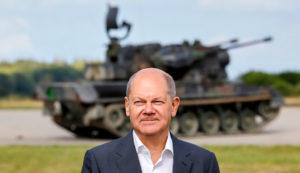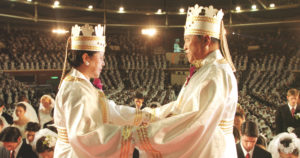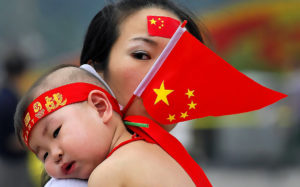Japan is on manoeuvres. The country for so long tethered — or protected, according to your point of view — by the “pacifist” constitution imposed upon it by the occupying Americans after the Second World War may be about to break free of its bonds. Last December, Prime Minister Fumio Kishida announced a doubling of the defence budget over the next five years and the acquisition of counter-strike capability to deal with the perceived threat from China, principally, and North Korea to a lesser extent. It is a policy shift which can only be described as seismic.
The plan will involve not only the upgrade of Japanese weapons but the procurement of at least 400 US-made Tomahawk cruise missiles. It is a decision some have interpreted as effectively superseding the pacifist constitution and putting Japan on the road to becoming a military superpower.
The initiative shows how seriously Japan’s government takes the threat of an invasion of Taiwan. A Chinese takeover would be calamitous, as it would endanger the shipping lines that supply much of the country’s manufacturing materials and nearly all of its oil. With an American response far from guaranteed, the Japanese clearly feel they need to take their own precautions and signal their intentions unambiguously.
At present, Japan has a unified military structure, the Japan Self-Defence Force (JSDF), founded in 1954. With nearly a quarter of a million personnel, its original purpose was domestic security, logistical (non-combat) support for international peacekeeping missions under the auspices of the UN, and reassuring the population that Japan wasn’t completely defenceless.
Japan was obliged, under Article 9 of the 1947 constitution, to renounce war as a “sovereign right of the nation” — the only country ever to do so. The exact wording stated that Japan would never again maintain “land sea or air forces”, but over time the JDSF has developed from its initial Dad’s Army-style and scale into a significant military force, with license to operate overseas, albeit in limited circumstances. The rearmament plan marks a significant step towards Article 9’s further reinterpretation, this time into virtual meaninglessness.
Japan’s defence from external threat has long been the preserve of US forces stationed in the country, sanctioned under the Security Treaty signed in 1951 and renewed periodically thereafter. A reorientation of this arrangement would liberate the US from much of its responsibility in the region and a good deal of the cost. The UK is also set to gain, as witnessed by the trinational fighter jet deal with Italy and new defence agreement signed in January.
How do ordinary Japanese people feel about it? The majority, it seems, are pleased. In an opinion poll published by public broadcaster NHK last month, 51% supported increased spending on the military, with 36% opposed. Where once any move to increase the radius of Japan’s military aegis would have seen thousands marching through the streets; now, there are only a few forlorn-looking protesters in Shinjuku station. The press is onside too, with even the Left-wing Tokyo Shimbun newspaper seemingly reconciled to the new direction.
The war in Ukraine has been a powerful catalyst in this change of mood. Nightly coverage of devastated Ukrainian cityscapes has reminded the Japanese that they have had their own quarrels with Russia in the past (over the Kuril Islands), and the threat of a nuclear option sends a chill down the spines of citizens of the only country to have suffered atomic destruction. Kishida himself is from Hiroshima and several members of his extended family were killed in the atomic bombing.
As for energy, Japan imports 90% of its supply — with 9% coming from Russia — and so is especially vulnerable to disruptions to supply chains. Last May, Kishida announced the restart of the country’s nuclear energy programme, partly suspended as a result of the Fukushima disaster. This, too, was met with little opposition. The anti-nuclear energy movement, once formidable, has weakened considerably in recent years in parallel with the anti-Article 9 revisionists. It was reported in August that 60% of Japanese supported the restart, fuelled by concerns of a winter energy crunch if the Russians were to cut off supply.
The personality of Kishida may be a significant factor too. It is ironic that the current Prime Minister, seen as a milder, more Left-leaning figure than his predecessor Shinzo Abe, should be the one to reposition Japan as a significant military power, realising his forebear’s lifetime goal. But Abe, whose father had volunteered to be a kamikaze pilot and whose grandfather was a Class-A war criminal, was too closely associated with the war, and with the far-Right, for his arguments for reforming Article 9 to be accepted without suspicion. He was seen by many, fairly or unfairly, as an ultra-nationalist who sought to restore Japan to its pre-war glory and military dominance.
Kishida, by contrast, isn’t viewed with such animosity. The mild-mannered former banker is part of the moderate Kōchikai faction within the ruling party, which has generally supported a dovish foreign policy. He has acquired a reputation as being broadly supportive of the pacifist constitution, or at least lukewarm about revising it. For this reason, the Japanese seem more willing to believe his argument — that, in an increasingly dangerous world, the rearmament is necessary and defensive in nature, and not part of a secret plan to return to the dark imperial past.
But can he pull it off? This is the big question. Germany has made similar promises about bolstering its lacklustre armed forces in recent months and so far, they have yielded few concrete results. Chancellor Olaf Scholz announced a €100 billion increase to its defence budget nearly a year ago, with promises to make a significant contribution to Ukraine. But apart from a few military vehicles, little has been forthcoming from the Federal Republic. There have even been hints that Germany may resile from its spending pledge altogether.
The rearmament plan could unfold in a similarly nebulous fashion in Japan. Announcing a major new policy direction is one thing, turning it into a reality quite another. Kishida’s once impressive approval ratings have plunged since his controversial decision to award Shinzo Abe a state funeral. Beset by scandals that have seen four cabinet ministers resign in the last year, and with the fallout from revelations of his party’s close relationship with the cultish Unification Church ongoing, his political capital is low.
As for actual capital, it is unclear how the rearmament will be funded. Koichi Nakano, Professor of Comparative Politics at Tokyo’s Sophia University, says it is “most likely unaffordable”, without adding to Japan’s already-colossal public debt. The Japanese economy is in terrible shape; 2022 saw a disastrous current account deficit, the Yen has tumbled, and that once-peculiar foreign phenomenon inflation has begun to manifest itself. Signs have gone up in shop windows apologising, in exquisitely formal language, for even modest price increases. Tax rises are the obvious answer, but polling suggests the Japanese are resolutely against higher taxes to pay for an increased military in times like these.
This leaves Kishida in danger of overpromising. For along with the military buildup, he has committed himself to dealing with Japan’s demographic crisis by huge increases in welfare spending. The world’s oldest country is losing hundreds of thousands of citizens every year as the old die off and the young stubbornly refuse to procreate. By some estimates, on this trajectory, the Japanese will cease to exist in a couple of hundred years. The obvious quick fix is a massive increase in immigration, but that is still anathema to most Japanese who view their culture as a unique and delicate artefact that wouldn’t survive the rough touch of legions of imported citizens. Many Japanese are asking themselves: will it be babies, or bombs?
Disclaimer
Some of the posts we share are controversial and we do not necessarily agree with them in the whole extend. Sometimes we agree with the content or part of it but we do not agree with the narration or language. Nevertheless we find them somehow interesting, valuable and/or informative or we share them, because we strongly believe in freedom of speech, free press and journalism. We strongly encourage you to have a critical approach to all the content, do your own research and analysis to build your own opinion.
We would be glad to have your feedback.
Source: UnHerd Read the original article here: https://unherd.com/




